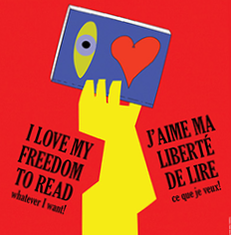|
http://www.jonimacfarlane.com/blog
Of all the crazy messed-u[ things going on, it’s the censorship of books that disturbs me the most. Recently, I read that Texas and Florida had banned Jack London’s The Call of the Wild from schools. Apparently, this happened a few years ago, but I’ve only just found out. Published in 1903, this classic work of American literature often finds itself on the American Library Association’s list of the 100-most frequently challenged classics. Why? Because it paints a picture of a past that is dark and bloody that is much rather forgotten, rather than one that can be admitted to, or learned from. If, like me, you’ve heard more about banned books over the past year than usual, it’s not just your imagination. In Florida, that bastion of American morality desperately trying to reinvest the past, a new policy has been enacted. It states that all books in schools must be approved by a librarian (called a “certified media specialist”) or teachers risk third-degree felony charges. Only vetted books are allowed to ensure they are free of pornographic material, age-appropriate, and don’t contain “unsolicited theories that may lead to student indoctrination” Banned Books Week in the U.S. is an annual event celebrating freedom to read, a shameful recognition if ever there was one. According to Pen America, educational gag orders that prevent teaching about topics like race, gender, and history have increased by 250% in 2020 compared to 2021. I imagine the numbers since then are even more harrowing. As a result, many books that address politically charged topics have either been banned or challenged in school districts, especially those that aim to educate about race and LGBTQ+ identities. Lest you think we Canadians are above such shenanigans, we celebrate our own Freedom to Read Week later month. Although attitudes towards censorship and book challenges are less of an issue here (for now, at least), we too have had our share of controversies. There are many people in the world of Canadian literature - children’s and teen’s literature in particular - who are affected by the actions and attitudes of intolerant individuals and our neighbours to the south. Canadians have also tried to remove books they deem offensive or inappropriate by certain audiences from public libraries and school. Sometimes they have succeeded and something they’ve failed. Here are a few examples from recent decades. Shocking, isn’t it? To Kill a Mockingbird by Harper Lee Brave New World by Aldous Huxley The Kite Runner by Khaled Hosseini A Jest of God by Margaret Laurence The Apprenticeship of Duddy Kravitz by Mordecai Richler Go Ask Alice by Anonymous The Book of Negroes by Lawrence Hill Such is My Beloved by Morley Callaghan Hold Fast by Kevin Major Lives of Girls & Women by Alice Munro This One Summer by Jillian Tamaki & Mark Tamaki The Impressions Series by Jack Booth & David Booth The Last of the Golden Girls by Susan Swan Of Mice and Men by John Steinbeck Underground to Canada by Barbara Smucker The Young in One Another’s Arms by Jane Rule Barometer Rising by Hugh MacLennan The Harry Potter series by J.K. Rowling Betty: The Helen Osborne Story by David Alexander Robertson The Handmaid’s Tale by Margaret Atwood The Wars by Timothy Findley The Golden Compass by Philip Pullman This list is far from exhaustive. Book banning is not just misguided parents. It’s a strategic political act, pushed by well-organized advocacy organizations. Information is power. They might as well be shouting to the masses: best to keep it out of your hands. I recommend you seek out, buy and read literature that is challenged or banned. Speak up on behalf of your children and grandchildren to read stories that tell them something about those who experience, think, or live differently than they do. They all add up to being human. In the meantime, happy reading! Joni
0 Comments
Leave a Reply. |
Archives
July 2024
Categories |

 RSS Feed
RSS Feed
